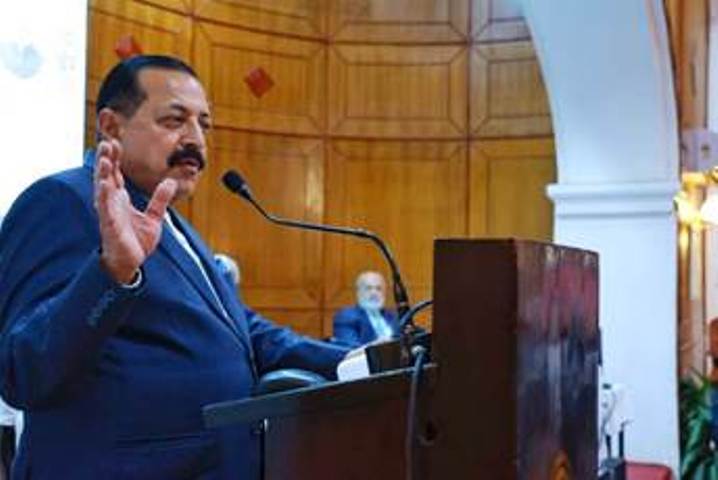Dr. Jitendra Singh Reviews Human Rights Concerns of Kashmiri Pandits with NHRC Member Priyank Kanungo
Dr. Singh lauded the Modi government’s commitment to addressing the grievances of the community, citing the Prime Minister’s more than 35 visits to Jammu & Kashmir.

- Country:
- India
Union Minister of State (Independent Charge) for Science and Technology, Minister of State (Independent Charge) for Earth Sciences, Minister of State in the Prime Minister’s Office, Department of Atomic Energy, Department of Space, and Personnel, Public Grievances, and Pensions, Dr. Jitendra Singh was briefed today by the National Human Rights Commission (NHRC) Member, Priyank Kanungo, regarding the human rights concerns of terrorism-affected families in Jammu & Kashmir, with a particular focus on the Kashmiri Pandit community.
Kanungo emphasized the NHRC’s commitment to safeguarding human rights across all sections of society, especially those who have endured prolonged suffering. He highlighted that the Kashmiri Pandit community had faced displacement, violence, and hardship for three decades without receiving due justice from previous administrations.
NHRC’s Commitment to Addressing the Plight of Kashmiri Pandits
During the meeting, Dr. Jitendra Singh reiterated the strong nationalist ethos of the Kashmiri Pandit community and affirmed that their welfare remains a top priority for Prime Minister Narendra Modi’s administration. He acknowledged the tragic history of the Kashmiri Pandit exodus, stating, “The plight of Kashmiri Pandits is unique as they became refugees in their own country overnight.”
Dr. Singh lauded the Modi government’s commitment to addressing the grievances of the community, citing the Prime Minister’s more than 35 visits to Jammu & Kashmir. These visits have facilitated the implementation of multiple welfare measures, including the provision of separate accommodations for Pandit families and initiatives to reintegrate them into the broader Kashmiri society.
Infrastructure and Connectivity Improvements in Jammu & Kashmir
In addition to social welfare initiatives, Dr. Jitendra Singh underscored the government’s focus on infrastructure development to bridge physical and emotional gaps. He pointed to the expansion of train networks and express corridors, ensuring improved all-weather connectivity. These developments are aimed at easing travel and communication, ultimately enhancing the quality of life in the region.
Strengthening Institutional Mechanisms for Human Rights Protection
Dr. Singh assured that both the Department of Administrative Reforms and Public Grievances and the Department of Personnel and Training (DoPT) would work collaboratively with the NHRC to institutionalize a mechanism for addressing grievances effectively. He emphasized the government’s unwavering commitment to safeguarding citizens’ rights through a robust and responsive governance framework.
He further elaborated on the importance of human rights in governance, stressing that under Prime Minister Modi’s leadership, human rights governance has been prioritized. As part of this initiative, the DoPT seeks to integrate human rights values into its training programs for government officials, ensuring that bureaucrats are well-versed in these critical issues.
Building a Human Rights-Oriented Bureaucracy
Dr. Singh highlighted the need for government officers who possess both emotional intelligence and intellectual capability to serve as human rights patrons within their respective departments. He asserted that sensitized officers could play a crucial role in promoting and protecting human rights across the country.
Recognition of Priyank Kanungo’s Role in Human Rights Protection
Dr. Jitendra Singh expressed confidence in Priyank Kanungo’s appointment as an NHRC member, lauding his dedication to human rights and welfare initiatives. He recalled Kanungo’s previous tenure as Chairman of the National Commission for Protection of Child Rights (NCPCR), commending his efforts in advocating for vulnerable sections of society.
Conclusion
In closing, Dr. Jitendra Singh conveyed his optimism that the NHRC would continue to play a proactive role in ensuring the protection of every citizen’s rights. He reaffirmed the government’s steadfast resolve to uphold human rights and provide justice to those who have long been marginalized.
The National Human Rights Commission of India (NHRC), established on 12 October 1993 under the Protection of Human Rights Ordinance, remains a pivotal institution for the protection and promotion of human rights, encompassing rights related to life, liberty, equality, and dignity, as enshrined in the Indian Constitution.










